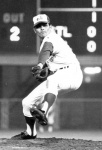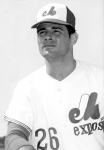Expos Get First Franchise No-Hitter Right Out of the Gate
This article was written by Norm King
This article was published in Spring 2012 Baseball Research Journal
The San Diego Padres have been around since 1969 and are awaiting their first. The New York Mets have been around since way back in 1962 and, amazingly, still do not have one.[fn]Baseball-almanac.com (www.baseball-almanac.com/recbooks/rb_noh2.shtml)[/fn] Yet the Montreal Expos, who started play in the same year as the Padres, set a record for the fewest games needed to have one of its pitchers pitch a no-hitter, when Bill Stoneman whitewashed the Philadelphia Phillies 7–0 in only the franchise’s ninth game.
 Stoneman walked five and struck out eight in what proved to be his first win as an Expo and only the fourth in the team’s history. It was also the first complete game of Stoneman’s career. Jerry Johnson took the loss for the Phillies in front of only 6,496 fans at old Connie Mack Stadium in Philadelphia.[fn]Baseball-Reference.com (www.baseball-reference.com/boxes/PHI/PHI196904170.shtml)[/fn]
Stoneman walked five and struck out eight in what proved to be his first win as an Expo and only the fourth in the team’s history. It was also the first complete game of Stoneman’s career. Jerry Johnson took the loss for the Phillies in front of only 6,496 fans at old Connie Mack Stadium in Philadelphia.[fn]Baseball-Reference.com (www.baseball-reference.com/boxes/PHI/PHI196904170.shtml)[/fn]
Considering the way the Expos and Stoneman, a 10th-round selection in the 1968 expansion draft, started the 1969 season, no one would have predicted a no-hitter. They won their first-ever game against the Mets 11–10 on April 8 and got pounded 9–5 in their second game the next day. Stoneman started and lost that one, giving up four earned runs in one-third of an inning and leaving the game with a 108.0 ERA.[fn]Baseball-Reference.com (www.baseball-reference.com/boxes/NYN/NYN196904090.shtml)[/fn]
Stoneman’s second outing was only slightly better. He pitched 82?3 innings and gave up all seven runs (one earned) in a 7–6 loss to the Cubs. He wasn’t helped by the team’s three errors.[fn]Baseball-Reference.com (www.baseball-reference.com/boxes/CHN/CHN196904130.shtml)[/fn]
Neither of these two starts, nor his pre-Expos days with the Cubs, foretold the immortality that was to come. Stoneman began his major league career in 1967. He earned the nickname “Toy Tiger” during his tenure in “the friendly confines,” as much for his height (5 feet, 10 inches), as for his determination. At a time when managers used relievers more as mop-up men than as specialists, Chicago skipper Leo Durocher gave him only two starts, while using him in relief 44 times. He also refused to let Stoneman use his curveball, even though Stoney ended up having one of the best in the National League.
His career with the Cubs was ancient history that night in Philadelphia. Stoneman faced 31 Phillies batters in the game, and the Expos scored three in the top of the ninth—including one by Stoneman himself—to give Stoneman more breathing room in the bottom of the inning. He finished the game in style, striking out Ron Stone and Johnny Briggs, then inducing the dangerous Deron Johnson to ground out to shortstop Maury Wills.[fn]Baseball-Reference.com (www.baseball-reference.com/boxes/PHI/PHI196904170.shtml)[/fn]

As with many no-hitters, fielding played a role. Don Bosch recovered from a late jump to grab a sinking fly ball from Don Money in the second, and Rusty Staub snared a liner off the bat of Tony Taylor in the third.
The no-hitter proved to have miraculous healing powers. “‘I’m supposed to have a dentist’s appointment today, for a new filling but maybe I won’t need it now,’ said Stoney, feeling no pain after his great personal triumph,” wrote Ted Blackman in The Sporting News.[fn]Ted Blackman, The Sporting News, May 3, 1969, 5[/fn]
The game also provided some revenge for Expos manager Gene Mauch, who was facing his former team for the first time since the Phillies fired him 54 games into the previous season. Not only did his new team lay a beating on his old one, but he was serenaded by the fans chanting “we want Mauch” from the seventh inning onward.[fn]Jacques Doucet and Marc Robitaille, Il était une fois les Expos, Volume I, Hurtubise, 82[/fn]
The Expos’ reaction to the event seems almost quaint by today’s standards. Management ripped up Stoneman’s contract and gave him a new one with a $2,000 raise. Then, between games of an April 20 doubleheader against the Cubs, the public address announcer asked fans to stay in their seats and then called Stoneman out of the dugout. Team president John McHale pointed to a new Renault car in center field, a gift from the Renault Company. However, the big surprise came when one of the car’s doors opened and out stepped Stoneman’s mother and a brother just back from Vietnam.
In his history of the team, former Expos broadcaster Jacques Doucet described how photos captured the atmosphere of that event, and how it reflected the impact of Stoneman’s achievement:
 The photos of the event spoke eloquently. Little Jarry Park, filled to bursting despite the wind and the cold. All the spectators, standing, many wearing toques and coats, acclaiming another of their new heroes. No more doubt existed, even among those who had remained the most sceptical: the meeting between Montreal and its baseball team was more than a success: it was love at first sight.[fn]Doucet and Robitaille, Ibid, 84 (author’s translation).[/fn]
The photos of the event spoke eloquently. Little Jarry Park, filled to bursting despite the wind and the cold. All the spectators, standing, many wearing toques and coats, acclaiming another of their new heroes. No more doubt existed, even among those who had remained the most sceptical: the meeting between Montreal and its baseball team was more than a success: it was love at first sight.[fn]Doucet and Robitaille, Ibid, 84 (author’s translation).[/fn]
The no-hitter was one of the few pitching bright spots for the first-year Expos. Stoneman went 11–19 and led the league in walks with 123. He did pitch five shutouts, which remains the franchise record (since tied by Steve Rogers, Dennis Martinez and Carlos Perez). The staff had a league-worst 4.33 ERA as the team struggled to a 52–110 record. That did not matter to Expos fans, though, who were so happy to have major league baseball that more than 1.2 million fans flocked to see the team, even though their tiny ballpark had a seating capacity of only 28,456.[fn]Ballparks.com (www.ballparks.com/baseball/national/jarryp.htm)[/fn]
“The early years of the Expos were a great time,” said Stoneman. “Even though we only won 52 games in 1969, people cheered from the first out to the last, and we drew 1.4 million [sic], which was pretty good attendance then.
“Being on an expansion team didn’t matter. We were happy to be in the majors and in Montreal. We loved playing there. It was like going to Europe and getting paid for it. We got a taste of a culture we didn’t even know was there.”[fn]Al Doyle, “Bill Stoneman: the game I’ll never forget: right-hander who tossed two no-hitters during his career recalls victory over Padres in which he fanned 14 batters” Baseball Digest, June 2005[/fn]
Years later, Stoneman admitted that he wasn’t overpowering that night. “People think that a pitcher who throws a no-hitter totally dominates the game, but that isn’t always true,” he said. “I had trouble with my control and gave up five walks, which is something that happened a lot in my career.”[fn]Doyle, Ibid.[/fn]
Nonetheless, Stoneman’s first no-hitter was no fluke. He repeated the feat on October 2, 1972, at Montreal’s Jarry Park against the Mets, winning by the same 7–0 score. Stoneman struck out nine, but had control problems, walking seven. Ironically, this was the last complete game of his career. He is the only pitcher in major league history to pitch no-hitters in his first and last career complete games.[fn]www.baseball-reference.com/bullpen/Bill_Stoneman[/fn]
Although that was the first major league no-hitter ever pitched outside the United States, Stoneman had almost performed that accomplishment on June 16, 1971. Cito Gaston of the Padres broke up his no-hit bid with a seventh-inning single during a 2–0 Expos win at Jarry Park. Stoneman contributed to his own cause in that game with an RBI single.
Stoneman pitched with the Expos until the end of the 1973 season, compiling a 51–72 record with the club. He pitched part of the 1974 season for the California Angels; after tallying a 1–8 record with a 6.14 ERA, the Angels called his career to heaven in July of that year. He was 54–85 with a 4.08 ERA lifetime.
While he had a modest record as a player, his post-baseball career was extremely successful. He became one of those rare former Expos who continued to live in Montreal after his playing days, working for Royal Trust, a Canadian financial institution. He then joined the Expos’ front office from 1984 to 1999, serving in a number of senior capacities. He was Vice-President for Baseball Administration and later Vice-President for Baseball Operations. He was also General Manager and Assistant General Manager.
In November of 1999, he became General Manager of the Anaheim Angels and held that post until 2007. Under his leadership, the Angels won the 2002 World Series. He now serves as a senior advisor to the team.
But to Expos fans, and there are still many, he will be best remembered for a pitching triumph on a cool night in Philadelphia that helped cement a love affair between a city and its new baseball franchise.
Table 1 (above) shows how many games it took each post-1960 expansion team to record its first no-hitter. The Mets and Padres are still waiting to be added to the list.
NORM KING lives in Ottawa, Ontario and has been a SABR member since 2010. His interests focus on baseball history from the Black Sox scandal onwards. He is retiring in November 2012 and plans to finally put his BA in history to good use; he’ll devote more time to conducting baseball research, particularly on players and events in the history of the Montreal Expos. He still misses them dearly.


